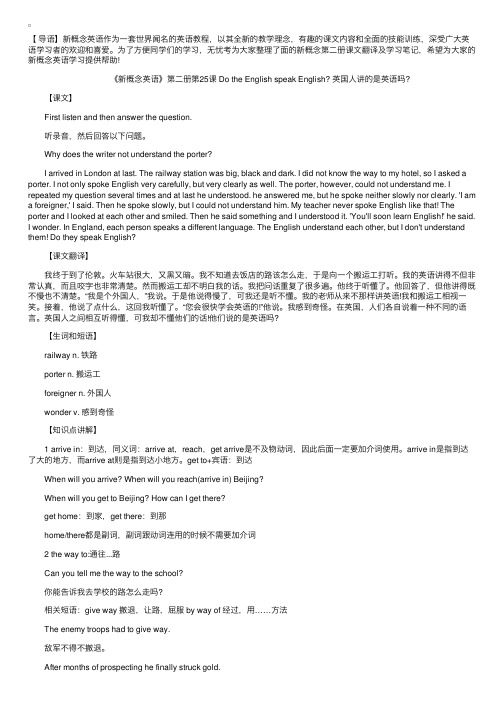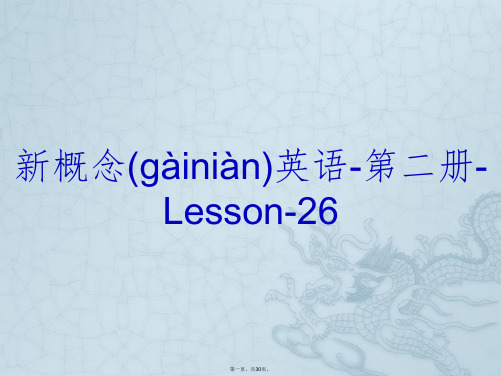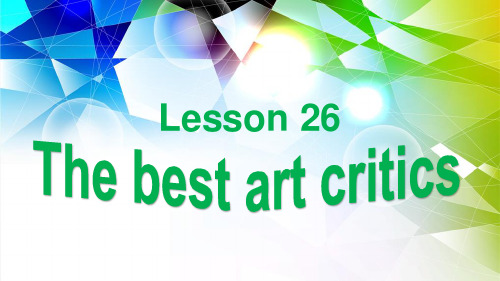新概念英语第二册Lesson__26
新概念英语第二册Lesson26课件

3:45 three quarters to three, three forty-five, forty-five to three
a quarter to four
fifteen to four
单独的时间表达+时间点之间的联系
I…. At 8
After an hour, I played the piano.
(3)安装……使能转动/摆动: Have you hung the door? 你把门装上了吗?
3.upside down (1)上下颠倒:
When Percy Buttons stands on his head, everything appears upside down to him.
You've hung the picture upside down. (2)乱七八糟,混乱不堪:
★whether conj. 是否 If 在表示是否的时候可以被whether所取代 If在表示如果的时候不可以用whether取代 If it will rain... Whether it will rain... Whether it will rain or not... I wondered if it will rain. Whether he is mad or not.
I can find nothing else here except an old dictionary.
5.…she always tells me whether my pictures are good or not.
连接词 whether…or not可以表示选择: I don't know whether you are interested (in it) or not.
新概念第二册课文翻译及学习笔记【Lesson25、26、27】

【导语】新概念英语作为⼀套世界闻名的英语教程,以其全新的教学理念,有趣的课⽂内容和全⾯的技能训练,深受⼴⼤英语学习者的欢迎和喜爱。
为了⽅便同学们的学习,⽆忧考为⼤家整理了⾯的新概念第⼆册课⽂翻译及学习笔记,希望为⼤家的新概念英语学习提供帮助!《新概念英语》第⼆册第25课 Do the English speak English? 英国⼈讲的是英语吗?【课⽂】First listen and then answer the question.听录⾳,然后回答以下问题。
Why does the writer not understand the porter?I arrived in London at last. The railway station was big, black and dark. I did not know the way to my hotel, so I asked a porter. I not only spoke English very carefully, but very clearly as well. The porter, however, could not understand me. I repeated my question several times and at last he understood. he answered me, but he spoke neither slowly nor clearly. 'I am a foreigner,' I said. Then he spoke slowly, but I could not understand him. My teacher never spoke English like that! The porter and I looked at each other and smiled. Then he said something and I understood it. 'You'll soon learn English!' he said.I wonder. In England, each person speaks a different language. The English understand each other, but I don't understand them! Do they speak English?【课⽂翻译】我终于到了伦敦。
(完整版)新概念英语第二册课后练习答案lesson26

Lesson 26练习答案Key to written exercises1.关键句型练习答案A These things always happen:I paint (1.1);people pretend that they understand (11.1-2);they…tell(1.2);We like (1.4);we like (1.5);I think (1.5);children… appreciate (11.5-6);They notice(1.7);she…tells(1.7);Do you like (1.11)(Note: Although the question Do you like it? <1.11> is asked at a particular moment, the meaning of like cannot be restricted to this moment.)These things are happening now:What are you doing (1.10);I'm hanging(1.11)B believe…are joking…don't know…know…believe…forget…looked…are you trying…believe…think…do you live…don't know2.难点练习答案‘Look!’she said,‘isn't that man drunk?’‘I think we should cross the road,’answered her husband.‘It's too late now,’she replied.‘Eh, you two. Look where you're going,’called the drunk.‘Can't you walk in a straight line?’3.多项选择题答案1. a根据课文第3行Of course, many pictures are not about anything(当然,有很多画是什么“意思”也没有的),只有a. You can’t always ‘explain’ modern pictures(你是往往不能解释现代画的含义的)最能表达作者暗示的意思,而其他3个选择都不是作者的想法。
新概念英语-第二册-Lesson-26

pretend pattern
v. 假装 n. 图案
curtain material
n. 窗帘,幕布 n. 材料
appreciate v. 鉴赏
no. 是否 v. 悬挂,吊
critically adv. 批评地 upside down 上下颠倒2地
They pretended to have been married.
6
第六页,共30页。
★pattern n. 图案(tú àn) ① n. 图案(tú àn) You can make a dress from this paper pattern. ② n. 模式, 典范
★curtain n. 窗帘,门帘 ring up / down the curtain
Beijing .
Beijing is larger than any city in China. Beijing is larger than any other city in China.
1.要注意比较的事物的前后(qiánhòu)一致性。
2.用比较级表达最高级的时候,如果是A个体
I looked at it again. She was right! It was! 13
第十三页,共30页。
参考译文: 我是个学艺术的学生, 画了很多画. 有很多人装 成很懂现代艺术的样子(yàng zi), 总是告诉你一 幅画的 “意思〞 是什么. 当然, 有很多画是什么 “意思〞 也没有的. 它们就是些好看的图案, 我 们喜爱它们就像我们喜欢漂亮的窗帘布一样. 我 觉得小孩子们往往比任何人都更能欣赏现代绘画, 他们观察到的东西更多. 我的妹妹只有7岁, 但她 总能说出我的画是好还是坏. 昨天她到我房里来 了.
新概念英语第二册Lesson26

paint • painter n. 画家,油漆工 • painting n. 画 oil painting 油画 Chinese painting 中国国 画
pretend v. 假装 • pretend to do sth.
她假装知道答案。
假装做......
She pretended to know the answer.
Lesson 26
New words
art • artist • artiste • arts • science n. 艺术 【U】 艺术家 ,画家 艺人 文科 理科
critic
n. 评论家 a literary critic
a music critic
• criticise
• critical
他问我:“你看过那部电影吗?” 他问我。He
asks me. I ever seen that film?
that if / wether
我看过那部电影吗? Have
He asks me if /wether I have ever seen that film?
He knows 不了现代艺术。
appreciate
• appreciate doing sth. 喜欢做......
I like... < I love... < I enjoy... < I appreciate...
notice • 1)v. 注意到 (细节上的注意,别人没注意到,你注意到了) • notice sb. do sth. pay attention to... • notice sb. doing sth. 思想上的注意 • notice + that 从句
新概念英语第二册 Lesson26 同步习题(含答案)

新概念英语第二册 Lesson26 同步习题(含答案)XXX 261.She was XXX.2.Did you notice your sister wearing a pair of glasses?3.Do you like that dress hanging on the shelf?4.Where to hold the meeting is still unknown.5.XXX.6.The little boy was reading a book。
but the book was upside down.7.XXX with a piece of chalk in his hand.8.This professor gave the student some raw materials to do the experiment.9.XXX.10.XXX's father nodded his head and Tom nodded his head in the same way.XXX:1.Do you often go to help the sick classmate with extra lessons after school?2.XXX XXX.3.What time do you usually get up?4.She always listens to light music before going to sleep.1.飞机将在七点起飞。
2.我能教我怎样分辨这两个建筑吗?3.请按照老师告诉你的方法做实验。
4.她只要努力,就能通过考试。
5.我注意到一只风筝在天空中高高飞翔。
6.英雄XXX被敌人绞死了。
7.如果你能帮我一个忙,我会非常感激。
四.A、B、C、D四个选项中选择能够填入空白处的正确选项。
1.XXX.2.The customer asked the salesgirl if the ring was made of gold.3.XXX when asked by the police.4.I noticed the water flowing out of the pipe but couldn't。
新概念英语第二册课后练习答案lesson26
Lesson 26案Key to written exercises练习答1 .关键句型练习答案A These things always happen :I paint (1.1) ;people pretend that theyunderstand (11.1-2) ;they ⋯tell(1.2) ;We like (1.4) ;we like (1.5) ;I think (1.5) ;children ⋯appreciate (11.5 -6) ;They notice(1.7) ;she ⋯tells (1.7) ;Do you like(1.11)(Note: Although the question Do you like it? <1.11> is asked at a particularmoment, the meaning of like cannot be restricted to this moment.)These things are happening now :What are you doing (1.10) ;I'm hanging(1.11)B believe ⋯are joking ⋯don't know ⋯know ⋯believe ⋯forget ⋯looked ⋯are you trying ⋯believe ⋯think ⋯do you live ⋯don't know2 .难点练习答案‘Look! ’she said, ‘isn't that man drunk? ’‘I think we should cross the road, ’answered her husband.‘It's too late now, ’she replied.‘Eh, you two. Look where you're going, ’called the drunk. ‘Can't you walk in astraight line? ’3 .多项选择题答案1. a3行Of course, many pictures are not about anything( 当然,有很多画是什么“意根据课文第思”也没有的),只有 a. You can?t always ,explain? modern pictures( 你是往往不能解释现代画的含义的)最能表达作者暗示的意思,而其他 3 个选择都不是作者的想法。
新概念英语第二册Lesson__26
check your answers
• The writer studies art and he paints a lot of pictures.Many people don't really understand modern art.Paintings don't always have a meaning.They are sometimes pretty patterns.Young children not only appreciate modern paintings better than others but they notice more.The writer's sister went into his room yesterday and she examined his new picture.He hung it upside up and she noticed this immediately.
listen again,and read after it • open your book, ask me questions.
• open your book, underline something important
1-5. adcba 6-10. ddabd 11-12. bd
Worห้องสมุดไป่ตู้s study
Does the writer study art, or does he study music? Does he paint a lot of pictures or not? (and ) Do many people really understand modern art or not? Do paintings always have a meaning or not? Are they sometimes pretty patterns or not? Do young children appreciate modern paintings better than others or not? Do they notice more or not? (not only…but) When did the writer’s young sister go into his room? Did she examine his new picture or not? (and) Had he hung it upside down, or had he hung it the right way up? Did she notice this immediately or not? (and)
新概念英语第二册26课课件
The Text
2. We like them in the same way that we like pretty curtain material.
【语言点】 pretty curtain material_漂__亮__的__窗__帘__布__ in the same way that =a_s__…__正__如__…__…_ 一样 in a way_以__某__种__方__式____
课文解析
The Text
1. Many people pretend that they understand
modern art.
【语言点】 • pretend to do sth. __假__装___…_…________ e.g. When his mother came in, the baby pretended
The Text
2. We like them in the same way that we like pretty curtain material.
【拓展】
• the same的用法 1. __同__样__的__人__;_同__样__的__事__物_____
e.g.His birthday and hers are the same. 2. 单__独__用__t_h_e__sa_m__e_,__可__指__刚__提__到__过__的__同__一__个__人__或__事物
The Text
2. We like them in the same way that we like pretty curtain material.
新概念英语第二册第26课
▪ 5、'I'm hanging this picture on the wall,' I answerd. ▪ the windows in the wall ▪ the picture on the wall ▪ 注意介词的不同 ▪ on the wall在墙上;在流浪 ▪ in the wall在墙里
They can appreciate modern arts best.
▪ better than anyone else 比其他任何人(表示最高级的 含义) 用比较级表示最高级: The teacher is the tallest. The teacher is taller than anyone else. (“else”不能少, 把主 语从“anyone”中排除)
Retell the story
1、Paul—art student—paint pictures 2、people—pretend—understand—modern art—tell—often— not about anything
The book is more expensive than anything else.
4、My sister is only seven, but she always tells me whether my pictures are good or not.
▪ 连接词whether…or not可以表示选择:
参考译文
我是个学艺术的学生, 画了很多画. 有很多人装成很懂现代 艺术的样子, 总是告诉你一幅画的 “意思” 是什么. 当然, 有很多画是什么 “意思” 也没有的. 它们就是些好看的图 案, 我们喜爱它们就何人都更能欣赏现代绘画, 他们观察到的 东西更多. 我的妹妹只有7岁, 但她总能说出我的画是好还是 坏. 昨天她到我房里来了.
- 1、下载文档前请自行甄别文档内容的完整性,平台不提供额外的编辑、内容补充、找答案等附加服务。
- 2、"仅部分预览"的文档,不可在线预览部分如存在完整性等问题,可反馈申请退款(可完整预览的文档不适用该条件!)。
- 3、如文档侵犯您的权益,请联系客服反馈,我们会尽快为您处理(人工客服工作时间:9:00-18:30)。
F T
F
F
T
【New words and expressions】
art n. 艺术 critic n. 评论家 paint v. 画 pretend v. 假装 pattern n. 图案 curtain n. 窗帘,幕布 material n. 材料 appreciate v. 鉴赏 notice v. 注意到 whether conj. 是否 hang v. 悬挂,吊 critically adv. 批评地 upside down 上下颠倒地
• ★pattern • 1) n. 图案,花样, 式样 = design What a pretty pattern! She wore a dress with a pattern of roses on it. • 2)n. 模式,方式 behavior pattern 行为方式 • 3) n.模范,榜样; She is a pattern of good behavior. 她是行为 的榜样。 • 4) adj. 榜样的 • a pattern wife/ husband模范太太/丈夫
• ★pretend v. 假装 • pretend to do sth. 假装做… the baby pretended to go to sleep. • pretend to be doing 假装正在做 The students pretended to be reading books • pretend that +从句 假装…… she pretended that she was not at home. • pretended adj. 虚伪的,只是表面的 pertended illness 装出来的病
• ★notice 1) v. 注意到,察觉到(不用进行时) notice sb do sth 注意到某人做某事(全过程) notice sb doing sth 注意某人正在做某事 Have you noticed her cry? / Did you notice him leaving? notice +从句 I’ve noticed that it is warmer here than in England. 2) n. 注意,察觉 The girl in red caught his notice. take notice of… 注意到,留心到(通常用于否定句) Take no notice of what others say about your way of life. 别理会别人对你生活方式的评论。 3) n.(书面的)通知,布告,海报 put up a notice 张贴布告 without notice 没事先通知,擅自
• curtain n. 窗帘,幕布 curtain material / curtain cloth 窗帘布 ring up the curtain 开幕 ring down the curtain 落幕 behind the curtain 在幕后地,秘密地
• ★material • 1) n. [C] 材料,原料 listening material building materials • 2) pl. 工具,用具 writing materials
• ★paint • 1) n. [U] 油漆 a pot/pail of 一桶油漆 Give the door two coats of paint .给那扇门刷 两层油漆 Wet Paint! 油漆未干! • 2) n. [C] 绘画颜料 oil paints 油画颜料 • 3) v. 刷涂,油漆,涂paint the house blue 把房子涂 成蓝色 • 4) v. 画;化妆;把 (药等)涂于paint a picture • 5)painting oil painting 油 Chinese painting 中国国 • 6)painter n. 画家,油漆工 a portrait painter 肖像画家
• ★whether conj. 是否=if
whether 和if的区别 1.当句末为or not时,引导词只能用whether 而不能用if. whether…or not =if 2.介词后,引导词只能用whether而不能用if. 3.与不定式连用,引导词只能用whether而不 能用 if. 4.从句放在 句首,引导词只能用whether而不能用 if. 5. if在表示“如果”的时候,不可以用whether 取 代
听力材料 建筑材料
书写工具
• ★appreciate v. 鉴赏 = understand and enjoy I can’t appreciate modern art. • appreciate sth. I appreciate it if you could do sth for me感激… I appreciate your help. = Thank you so much for your help.很感激你的帮助 • appreciate doing sth. 喜欢做某事 • appreciation [ə,pri:ʃi:'eɪʃən] n. [U] 欣赏, 感谢I show no appreciation of jazz.
• ★art n. 艺术 • 1) [U] 艺术,美术 • an art gallery ['ɡæləri] 画廊 • Art is long; Life is short. (谚)艺 术长久,人生短暂。 • artist n. 艺术家,画家
• • • • •
★critic n. 评论家 a music critic 音乐评论家 a theatre critic 戏剧评论家 a literary [‘litərəri] critic 文学评论 critical adj. 批评的,评论的, 苛刻的,岌 岌可危的,(疾病)危急的 • You are critical. 你很挑剔。 • 3 critically adv. 苛刻地,非难地 • She looked at my picture critically. 她用挑 剔的目光看我的画。
张大千,中国泼墨 画家,书法家。二 十多岁便蓄著一把 大胡子,成为张大 千日后的特有标志。
列昂纳多· 达· 芬奇 英 文Leonardo Di Ser Piero Da Vinci文艺 复兴时期最完美的 代表”,是人类历 史上绝无仅有的全 才
他是一位思想深邃,学识渊 博、多才多艺的画家、数学 家、天文学家、预言家、发 明家、医学家、生物学家、 建筑工程师和军事工程师。 他是一位天才,他深入研究 光学、数学、地质学、生物 学等多种自然科学的学科。 他的艺术实践和科学探索精 神对后代产生了重大而深远 的影响。小行星3000被命 名为“列奥纳多”以表示人 们对列奥纳多· 达· 芬奇的尊 敬和怀念。
• Who is the student’s best critic?
His sister is the student’s best critic.
Read the story & decide True or False 1.The writer is a famous painter and he paints a lot of pictures. 2. Many people like pretending that they understand modern art. 3. Of course, many pictures are “about” something. They are not just pretty patterns. 4. People don’t like those pictures in the same way as pretty curtain material. 5. The writer thinks young children often appreciate modern pictures better than anyone else.
文森特· 威廉· 梵高(Vincent Willem van Gogh,1853- 1890),荷兰后印象派画 家。他是表现主义的先驱, 并深深影响了二十世纪艺 术,尤其是野兽派与表现 主义
毕加索,西班牙画家、 雕塑家。法国共产党党 员。是现代艺术的创始 人,西方现代派绘画的 主要代表。
Listen to the tape and answer the questions
3. Is it easy to understand the paintings?
徐悲鸿(18951953年),现代 画家、美术教育 家。所作国画彩 墨浑成,尤以奔 马享名于世
齐白石是近现代中国绘 画大师,世界文化名人。 擅画花鸟、虫鱼、山水、 人物,笔墨雄浑滋润, 色彩浓艳明快,造型简 练生动,意境淳厚朴实。
FHale Waihona Puke TF FT
Read the story & decide True or False
6.The writer’s sister is only seven years old, so she can’t understand the pictures. 7. Yesterday the writer was hanging the picture on the wall when his sister came in. 8. The picture which the writer was hanging was an old one. 9. I found the picture was upside down. 10. My sister looked at the picture critically for only a moment before she said that it was all right.
Lesson 26 The best art critics
